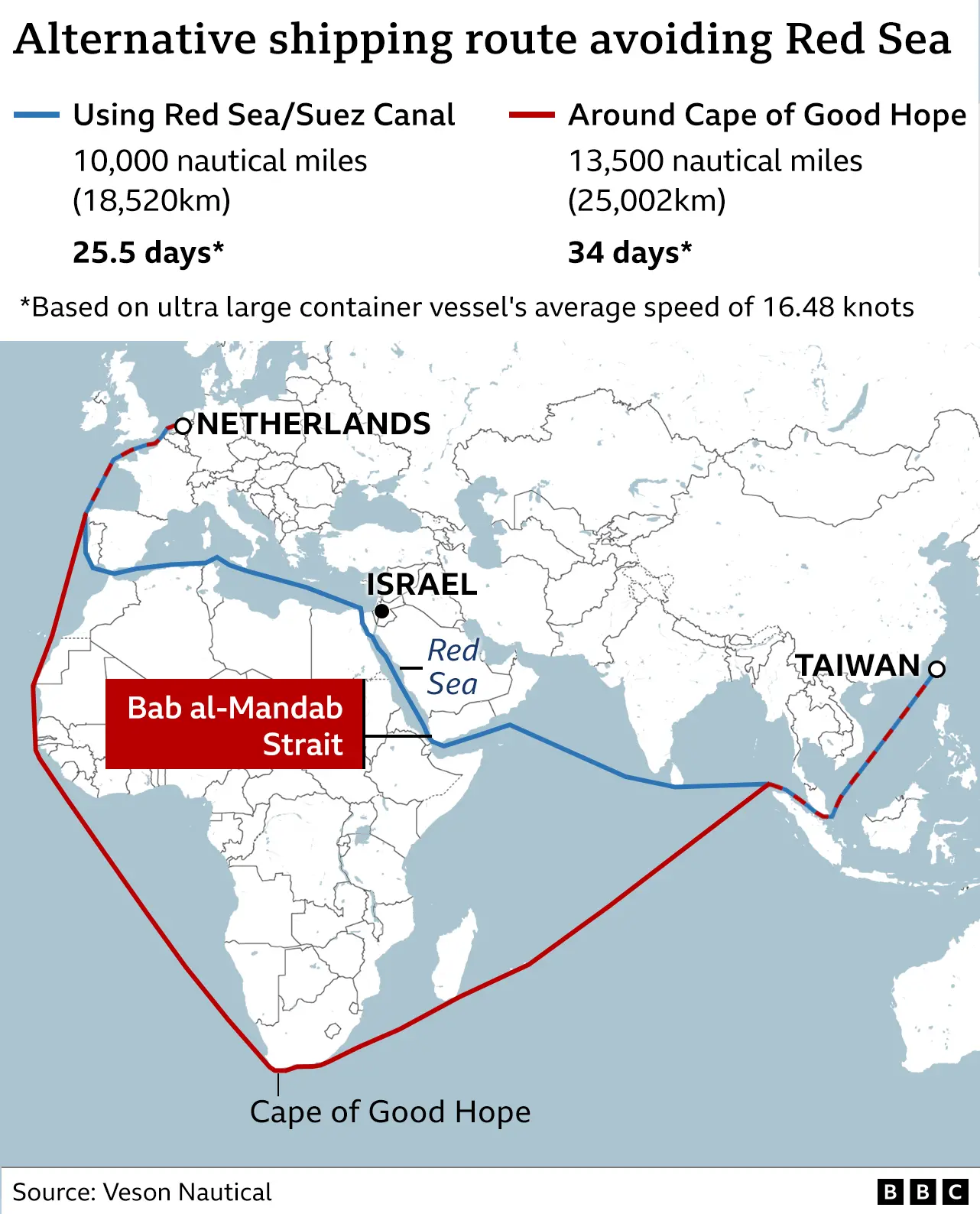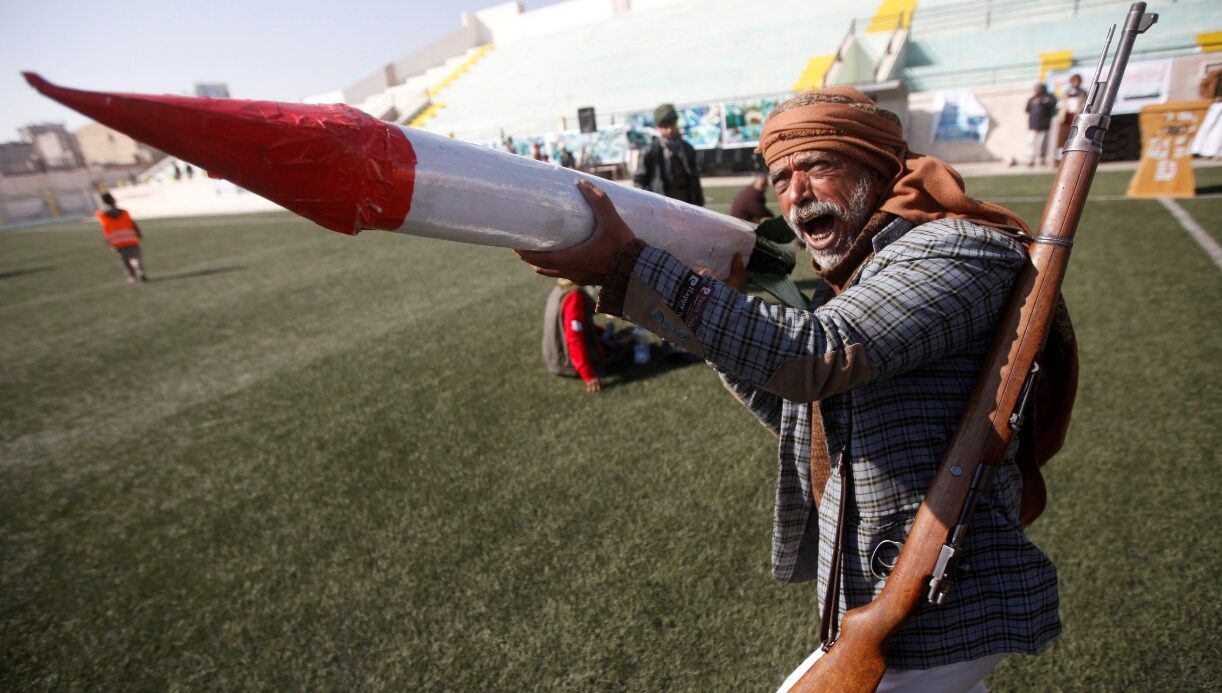This was bound to happen.
For whatever reason – and I’ve heard several explanations – no one wants to address the Houthi attacks on cargo ships right now.
Whether they are letting it build up to a point where it is more extreme than it is now, or whether they are trying to avoid a wider war, the media is not addressing the truly extraordinary attacks on these ships.
BP has halted all shipments of oil and gas through the Red Sea after an increase in attacks on cargo ships by Houthi militants in Yemen, including two further strikes on Monday.
The British oil major said it had paused shipping in the region indefinitely, citing a “deteriorating security situation” amid tensions in the Middle East.
BP becomes the first oil firm to directly halt its own tankers, after a string of big shipping companies stopped their vessels passing through the waters between Asia and Africa that connect the Indian Ocean to the Mediterranean, with the Suez canal at the tip.
Freight companies are sailing ships around Africa instead, adding costs and delays that are expected to mount in coming weeks.

This looks like a pretty big detour
Companies have moved to secure their vessels after attacks by Houthi rebels in protest over Israel’s war against Hamas in Gaza. They have fired on commercial ships travelling through the Bab el-Mandeb strait, a narrow channel nicknamed the Gate of Tears for its notorious difficulty to navigate, and on a US warship.
On Monday, Houthis attacked two further commercial ships with naval drones – the MSC Clara, which is a Panama-flagged vessel and the Norwegian-owned Swan Atlantic.
It’s incredible that this is not the top headline.
It’s literally back-page news.
That tells you something else is going on here than what can easily be observed.
The Swan Atlantic’s owner said the ship had been struck by an unidentified object and its water tank had been damaged but none of the crew were hurt.
BP said in a statement: “In our trading and shipping business, as in all BP businesses, the safety and security of our people and those working on our behalf is BP’s priority.
“In light of the deteriorating security situation for shipping in the Red Sea, BP has decided to temporarily pause all transits through the Red Sea. We will keep this precautionary pause under ongoing review, subject to circumstances as they evolve in the region.”
The US defence secretary, Lloyd Austin, announced the formation of a maritime protection force, Operation Prosperity Guardian, to defend shipping from the attacks.
Austin said the taskforce would include the UK, Bahrain, Canada, France, Italy, the Netherlands, Norway, Seychelles and Spain, and it would “jointly address security challenges in the southern Red Sea and the Gulf of Aden, with the goal of ensuring freedom of navigation for all countries and bolstering regional security and prosperity.”
That’s the thing to watch.
The Houthis are not backing down, so this will mean, in theory, attacks inside of Yemen by Western forces.
Then it becomes: “Okay, well – we need troops on the ground to stop these attacks.”
You feel me?
Separately on Monday, the global container shipping firm Evergreen said it was suspending journeys in the region “until further notice” because of “rising risk and safety considerations”.
Evergreen joined five other big shipping firms who have already suspended operations: the Hong Kong-based OOCL, Denmark’s Maersk, France’s CMA CGM, Germany’s Hapag-Lloyd and the Italian-Swiss-owned Mediterranean Shipping Company.
Taiwan’s Yang Ming Marine Transport Corporation said it would divert any of its ships sailing through the Red Sea or Gulf of Aden via the Cape of Good Hope for the next two weeks.
The Norway-based oil tanker group Frontline said its vessels would also start avoiding passages through the Red Sea and the Gulf of Aden.
BP has paused all shipments it is responsible for, either through its own ships or chartered vessels. BP puts cargoes of liquified natural gas, oil and oil-based products in transit.
The price of Brent crude rose almost 4%, to $79.39.
Yeah, it’s a big deal.
And as we’ve said, the think tanks point to Yemen as the best place to expand this war. Israel is actually openly saying this now.
Meanwhile, the Americans don’t want to expand it, because they’re not ready for a global war against all Moslems, which could happen. (Maybe it won’t, I don’t know, no one knows, but it could.)
This will probably fail

